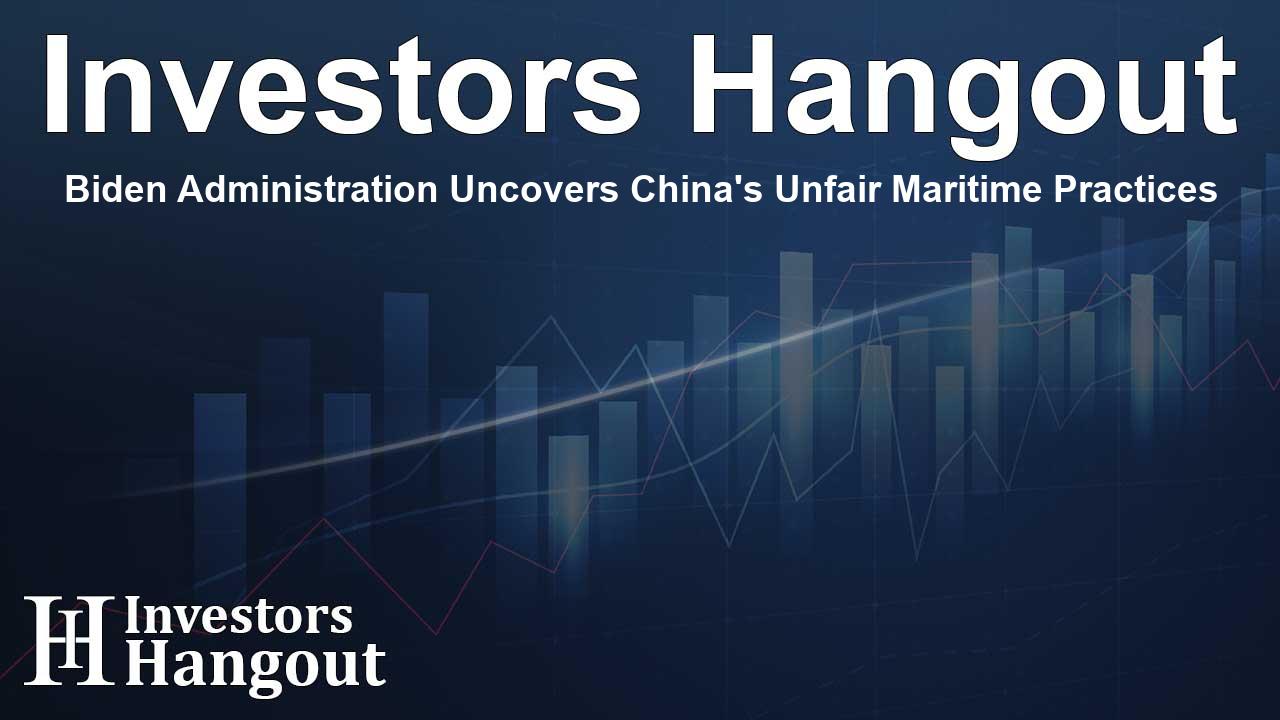Biden Administration Uncovers China's Unfair Maritime Practices

Biden Administration Uncovers Unfair Practices in Maritime Trade
The Biden administration has released significant findings highlighting that China engages in unfair practices that enable it to dominate the global maritime, logistics, and shipbuilding industries. This conclusion stems from a comprehensive trade investigation initiated by U.S. Trade Representative Katherine Tai, as reported by various sources familiar with the situation.
The Investigation's Origins and Purpose
Launched in April 2024, this investigation was spurred by multiple requests from U.S. labor unions, including the United Steelworkers, who sought clarity on unfair international trade practices. It was conducted under Section 301 of the Trade Act of 1974. This section allows the U.S. government to address actions by foreign nations that it deems unreasonable, unjustified, or detrimental to American commerce.
Specific Findings Against China
The findings of this inquiry revealed that China has purposefully targeted key sectors, particularly shipbuilding and maritime industries, in an effort to assert dominance. Reports indicate that China has employed various tactics, including financial aid, creating barriers for foreign businesses, enforcing technology transfer, and committing acts of intellectual property theft. These practices reportedly tilt the scales in favor of China's shipbuilding and maritime sectors, creating an uneven playing field.
Financial Support and Market Manipulation
Moreover, China has been accused of artificially suppressing labor costs within its maritime, shipbuilding, and logistics sectors. This strategy not only strengthens its position in global markets but also raises concerns regarding fair competition on a broader scale.
Implications for Global Trade
These findings are significant as they could lead to actions aimed at protecting U.S. interests and could alter the dynamics of global trading relationships. The U.S. government has the ability to impose penalties on foreign entities partaking in such practices, potentially reshaping how international maritime trade is conducted.
Conclusion and Future Outlook
As the U.S. continues to assess its trade policies and relationships, the conclusions drawn from this investigation highlight a critical moment in international trade dynamics. The administration's commitment to addressing these issues reflects broader concerns regarding fair practices and economic competitiveness.
Frequently Asked Questions
What prompted the investigation into China's practices?
The investigation was motivated by requests from U.S. unions aiming to address and clarify concerns regarding unfair trade practices in the maritime and shipbuilding industries.
What are the specific unfair practices identified?
The inquiry identified financial support for Chinese industries, barriers to foreign competition, enforced technology transfers, and intellectual property theft as tactics used by China to gain competitive advantages.
What is Section 301 of the Trade Act of 1974?
Section 301 allows the U.S. government to impose penalties on foreign nations that engage in practices deemed unreasonable or unjustifiable, impacting U.S. commerce.
What could be the implications of these findings?
The findings may lead to actions that protect U.S. interests, potentially altering global trading relationships and how maritime trade is approached on an international scale.
How does this affect labor costs in the maritime industry?
The suppression of labor costs in China's sectors can distort market competition, impacting laborers globally, particularly in the U.S. and other countries competing with China.
About Investors Hangout
Investors Hangout is a leading online stock forum for financial discussion and learning, offering a wide range of free tools and resources. It draws in traders of all levels, who exchange market knowledge, investigate trading tactics, and keep an eye on industry developments in real time. Featuring financial articles, stock message boards, quotes, charts, company profiles, and live news updates. Through cooperative learning and a wealth of informational resources, it helps users from novices creating their first portfolios to experts honing their techniques. Join Investors Hangout today: https://investorshangout.com/
Disclaimer: The content of this article is solely for general informational purposes only; it does not represent legal, financial, or investment advice. Investors Hangout does not offer financial advice; the author is not a licensed financial advisor. Consult a qualified advisor before making any financial or investment decisions based on this article. The author's interpretation of publicly available data shapes the opinions presented here; as a result, they should not be taken as advice to purchase, sell, or hold any securities mentioned or any other investments. The author does not guarantee the accuracy, completeness, or timeliness of any material, providing it "as is." Information and market conditions may change; past performance is not indicative of future outcomes. If any of the material offered here is inaccurate, please contact us for corrections.